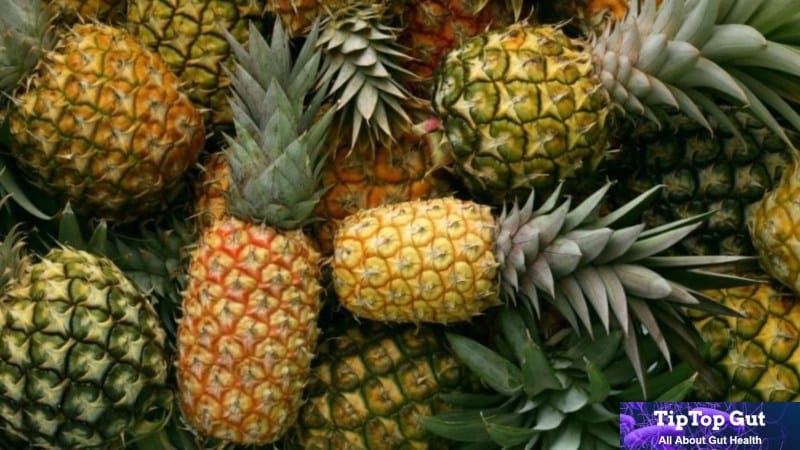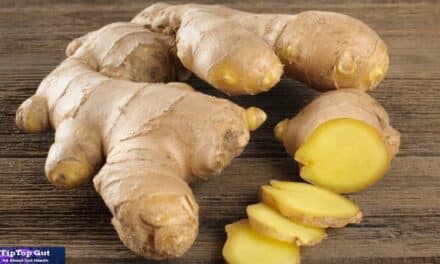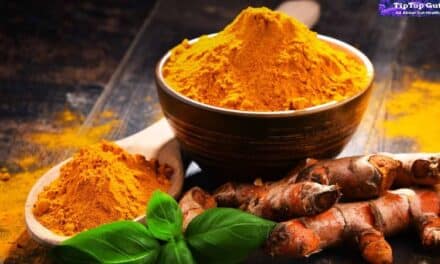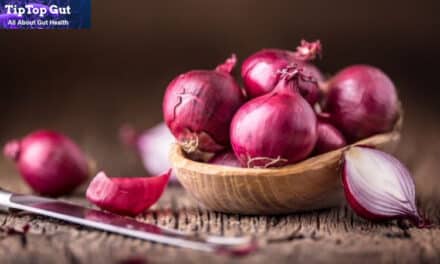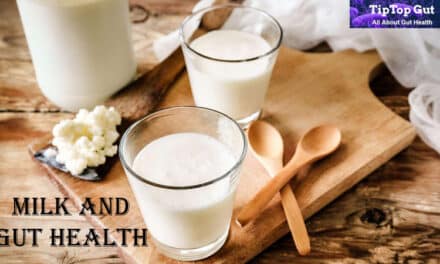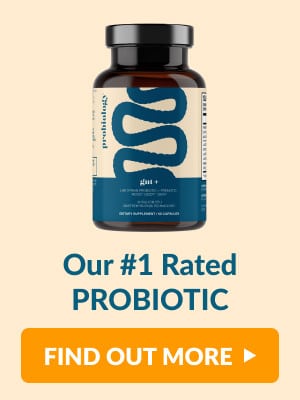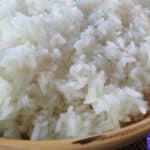Pineapple is more than simply a drink that can successfully disguise the flavor of unpleasant things (like vodka and semen). Pineapple has a specialized digestive enzyme called bromelain, which helps us decompose proteins and makes it easier for us to digest and absorb nutrients.
The anti-inflammatory qualities of bromelain can aid in reducing discomfort and stomachaches.
Several berries have fused to form a pineapple. The spiky external layer has “eyes,” hexagonal forms; each “eye” has a fruit.
The “crown” of a pineapple, which consists of the thick, prickly leaves at the top, shields the fruit from the oppressively hot tropical climate. A single pineapple matures over roughly three years. Is pineapple good for gut health? To learn more, keep reading.
Is Pineapple Good for Gut Health?
The sole food supply for the digestive enzyme bromelain, which aids in the breakdown of protein-containing foods, is the pineapple.
Studies suggest that one cup of pineapple contains about 10% of the recommended fiber intake. Fiber is vital for a healthy gut and helps prevent appetite. Pineapple is high in minerals and vitamins and low in calories. As a result of one cup of pineapple chunks:
Copper, potassium, and magnesium are among the many minerals found in pineapple that your body requires for healthy operation.
Vitamin C, which promotes tissue growth and repair, is provided in about one-third of the required daily dose. Vitamin C can help boost your immune system and may also guard against arthritis, cancer, and heart disease.
B vitamins: A healthy serving of numerous B vitamins, such as thiamin, niacin, B6, and folate, are provided by pineapple. These vitamins and minerals aid in the body’s digestion of food’s energy. Additionally, they play a crucial role in producing new red blood cells, which transport oxygen to your tissues and organs.
Manganese: Pineapple contains more than 100% of the daily allowance of this crucial trace metal. Manganese supports metabolism, immune system health, and bone growth.
Despite having few calories, pineapples offer an impressive nutritional profile. The following nutrients can be found in 165 grams (1 cup) of pineapple chunks:
- Calories – 83
- Carbs – 21.6 grams
- Copper – 20% (DV)
- Fat – 1.7 grams
- Fiber – 2.3 grams
- Folate – 7% (DV)
- Iron – 3% (DV)
- Manganese – 109% (DV)
- Magnesium – 5% (DV)
- Niacin- 5% (DV)
- Potassium – 4% (DV)
- Pantothenic acid – 7% (DV)
- Protein – 1 gram
- Riboflavin – 4% (DV)
- Thiamine – 11% (DV)
- Vitamin C – 88% (DV)
- Vitamin B6 – 11% (DV)
How Pineapples Can Help Your Gut Health?
Another fruit that could help with bloating is pineapple. This tropical fruit includes bromelain, which has anti-inflammatory and cancer-preventative effects and lessens swelling, bruising, and other aches brought on by injuries. The high fiber and water content of pineapples can aid digestion and prevent constipation.
Pineapple as a Probiotic Food
Because it contains bromelain, fiber, and water, pineapple is beneficial for digestion. Pineapples aid bowel movements, encourage regularity and promote a healthy digestive system. Bromelain helps alleviate bloating, gas, and cramping by reducing inflammation in the digestive tract. Similarly, it breaks down proteins to help with digestion.
Read More:
Biotics 8 Review: SCAM or A Legit Probiotic for Men?
Other Health Benefits of Pineapple
Following are some of the health benefits of Pineapple.
Enhances healing of tissues
Bromelain, an enzyme that speeds up the healing process for your skin and tissues, is exclusively found in pineapple. Bromelain appears to produce compounds that fight swelling and discomfort.
Consuming bromelain from pineapple may also speed up the recovery of damaged or post-operative skin.
Helps reduce inflammation
Inflammation is a normal bodily function that helps us fight off illness. The anti-inflammatory effects of bromelain can help in the battle against chronic inflammation, which can result in conditions like rheumatoid arthritis and cancer against inflammation and may slow the growth of some malignancies.
In short, eating pineapple doesn’t guarantee that you won’t get cancer. But eating a variety of vibrant fruits and vegetables, such as pineapple, is a smart strategy to help against cancer and other diseases.
Helps reduce pain associated with arthritis
People with osteoarthritis may experience pain alleviation thanks to the anti-inflammatory properties of pineapple’s bromelain. Try including pineapple in your diet if you suffer from achy joints due to osteoarthritis, but don’t stop taking your medications or adjust the dosage without consulting your doctor.
Supports weight loss
When trying to lose weight, most weight reduction professionals advise eating lots of fruits and vegetables. However, pineapple might be your diet’s best fruit friend because it contains enzymes that could aid in fat burning. However, including some of this beneficial fruit in your diet could be good.
Promotes recovery after exercise
An inevitable ache that can keep you from moving for up to three days results from the inflammation that your working muscles produce. Adding pineapple to your post-workout smoothie can enable you to resume your training program a little sooner. Muscles may be soothed by the anti-inflammatory effects of pineapple and may recover more quickly.
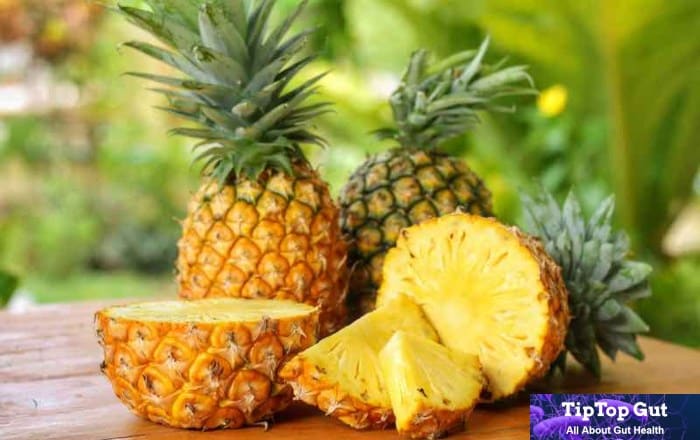
Antioxidants that fight disease
Your body processes food while you consume it. Free radical molecules are produced as a result of this action. The same is true of radiation exposure and smoking. The antioxidants, flavonoids, and phenolic acids, which protect your cells from free radicals that can lead to chronic disease, are abundant in pineapples.
Not only are pineapples nutrient-dense, but they are also a trove of antioxidants that protect your body from oxidative stress.
Free radicals, unstable chemicals that harm cells and are frequently associated with chronic inflammation, compromised immune systems, heart disease, diabetes, and some types of cancer, are the leading cause of oxidative stress.
In addition, many of the antioxidants in pineapple are known to be “bound antioxidants,” meaning they have a more significant effect over time.
Reduces risk of cancer
Uncontrolled cell growth is a recurring condition found in cancer. Oxidative stress and persistent inflammation are frequently implicated in its progression. Studies suggest that the chemical bromelain, which is present in pineapple, may reduce the risk of cancer by reducing oxidative stress and inflammation.
According to certain research, bromelain may also be used to treat cancer that has already manifested. In one test-tube investigation, bromelain, for example, was found to inhibit the growth of breast cancer cells and trigger cell death.
Similar outcomes for cutaneous, colorectal, or bile duct malignancies have been seen in other test-tube trials. Additionally, prior test-tube and animal research have discovered that bromelain may encourage the immune system to manufacture chemicals that increase the capacity of white blood cells to stifle cancer cell growth and eradicate cancer cells.
Despite conflicting evidence, one analysis of human studies concluded there was no advantage to taking oral enzymes like bromelain in addition to cancer treatment.
Supports immunity
For many years, traditional medicine has employed pineapples. Bromelain is one of many minerals, vitamins, and enzymes they contain that may work together to boost immunity and lessen inflammation.
How to Include Pineapple into Your Diet?
Adding pineapples to your diet is simple, convenient, and tasty. You can easily purchase fresh fruit in many markets and grocers, even out of season. All year long, you may get it in canned, dehydrated, or frozen form.
Pineapple can be eaten alone, on salads, in smoothies, or on home-made pizza. Here are a few entertaining recipes that incorporate pineapple:
- Smoothie for breakfast with blueberries, pineapple, and Greek yogurt
- Tropical roast chicken, almonds, blueberries, and pineapple on a bed of lettuce or other greens make up this salad.
- Lunch will be handmade Hawaiian hamburgers (beef burgers with a pineapple ring)
- Dinner will be seitan and rice with pineapple.
- Dessert: home-made pineapple whipped cream (frozen pineapple chunks blended with a splash of coconut milk and a dash of lemon juice)
Read More:
Best Morning Drink for Gut Health: 7 Healthiest Drinks for Digestion
Does Eating Pineapple Cause Any Health Risks?
Infrequent allergens include pineapples. Unless you have a known pineapple allergy, eating them is thought to provide very little danger. In that situation, you should avoid pineapple and pineapple extracts.
People with diabetes should be aware of serving quantities to maintain stable blood sugar levels.
However, more than a few portions of pineapple per day may have unwanted adverse effects, even in persons who do not have diabetes or an allergy.
Bromelain, for instance, may have an impact on blood coagulation. As a result, those who use blood thinners should only consume small amounts of pineapple.
Although these side effects are anecdotal and have not been thoroughly researched, those sensitive to bromelain may also suffer tongue burning, itching, nausea, or diarrhea.
According to some, many unripe pineapples might cause diarrhea, nausea, and upset stomachs. Again, there has yet to be any research on this, but it’s always ideal to choose ripe pineapple. It should have light to medium yellow flesh.
Concluding Now!
Pineapples are sweet, adaptable, and packed with vitamins and antioxidants. A lower risk of cancer, improved digestion, and relief from osteoarthritis are just a few of the outstanding health advantages associated with their nutrients and chemicals. However, further human research is required.
This fruit can be consumed in various ways, including fresh, blended, roasted, sautéed, and sauteed.
FAQs about Pineapple and Gut Health
Does pineapple help with inflammatory bowel disease?
In your intestines, the enzymes in pineapple juice assist in breaking down protein, which can lessen gas, bloating, and constipation. Besides reducing gut inflammation, bromelain’s antibacterial capabilities can shield your gut from germs like E. coli that cause diarrhea.
Will pineapple help my leaky gut?
When consumed on an empty stomach, the pineapple bromelain also lessens pain and gastrointestinal inflammation. As a result, it might aid in fostering a healthy gut lining and avoiding leaky gut syndrome. Pineapples are available at any grocery shop or natural foods store.
Is pineapple a probiotic?
Pineapple could be considered a potential substitute for conventional functional food because it is an excellent substrate for the growth of probiotic bacteria such as Lactobacillus and Bifidobacterium strains.
Is pineapple a source of IBS treatment?
Pineapple can aid in digestive problems ranging from diarrhea to irritable bowel syndrome (IBS). Bromelain aids in digestion improvement and the breakdown of proteins.
Who should avoid pineapple consumption?
Additionally, several medicines and bromelain may interfere. Avoid overeating pineapple if you’re using antibiotics, blood thinners, anticoagulants, anticonvulsants, barbiturates, benzodiazepines, sleep aids, or tricyclic antidepressants.
Read More:
Best Probiotic for Gut Health and Bloating: According to Health Expert
Best Probiotic for Gut Health and Weight Loss: An Ultimate Guide
Best Over the Counter Probiotic for Gut Health: Easy Guide 2022
Best Probiotic for Vaginal and Gut Health: The Best Guide 2022

